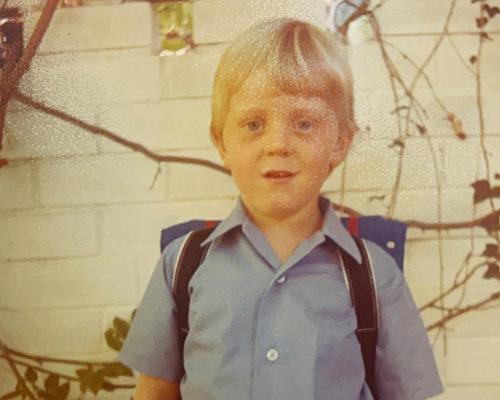
Born in 1975 in Northampton and raised in Perth, Australia, Tim Minchin is a musician, comedian, actor, writer and director. Starting out in musical theatre, he turned to comedy in 2003, winning the 2005 Perrier best newcomer at the fringe. In 2008, the Royal Shakespeare Company commissioned him to write music and lyrics for a stage adaptation of Roald Dahl’s Matilda – it has since won seven Olivier awards and four Tonys. He is married with two children and lives in Sydney. His new album, Tim Minchin Time Machine, is out now. Matilda the Musical is playing in the UK and Ireland.
As photos were so rare in the 80s, compared with now, there’s a formality to my physicality here. I look proud, but as I didn’t like primary school, I would have been unhappy that it was time to go to class. I found the whole school experience very scary.
I was a sickly kid. Not in a Dickensian way – I didn’t have consumption – but I wasn’t very hardy. I had asthma and allergies and I was quite deaf for a lot of my childhood. Because of that, I’d get in trouble for not listening in lessons, when in reality I couldn’t hear what the teacher had said.
Physical ailments aside, I was a gentle, sensitive child. So much so that my mum was surprised about what happened to me professionally. She’d say: “But you were my little cuddly one!” As well as having loving parents, I was lucky with my siblings. I grew up with an older brother who’s also a soft guy – we wrestled and played outside, but he wasn’t a big frightening presence that I had to develop armour to survive.
After primary school, I went to an all-boys’ school where I was a soprano, and pretty good at theatre, too, although I didn’t get the lead roles. I loved sport and was really good at hockey, and always in the top teams. I wasn’t a prefect, and I sometimes got in trouble for being cheeky. I had a privileged education and received the sort of confidence you get with that, but I don’t think I’m a monster. It wasn’t Eton. Anyway, I think how you turn out has much more to do with what’s happening at home, and my family was totally plugged in: disciplined but attentive.
There was a fair bit of Von Trapp stuff going on around the house, too – a piano, some intergenerational harmonising. But that drive to become an entertainer truly came from a fundamental need for affirmation. I wanted people to like me, and I wanted to show that I was clever. Maybe it’s also because I am a second child with an outstanding older brother, but mostly it’s in the wiring. Not many people admit it: actors, musicians, writers, they all talk about how they want to change the world, or that they are a storyteller. But, essentially, we just like being clapped.
As a teenager I was compulsively meta-cognitive, which might make me appear self-important or smug, but it took me years to realise that not everyone is always thinking about their thoughts. Despite that, I wasn’t very navel-gazing. I wasn’t particularly cool or uncool. I didn’t fit into any cultural tribe and I was definitely not a rebel. I think it’s a family thing: I never felt like I was the black sheep or had the instinct to kick against or pull away from them, like: “Fuck my middle-class parents! Fuck my really nice, kind, hard-working dad! Fuck my slightly bonkers but incredibly passionate mother!”
I never really had a dream, either, but I definitely had a defiance – I was sure I was going to keep writing. I started doing musical theatre at 18, and I noticed that people cried at my songs. I realised I could do something that not everyone around me could do. Because I was in Perth, I thought: “Well, if I’m good in Perth, when I move to Melbourne, there’ll be 100 other guys like me.” Then I moved and, while there were lots of talented people, I kept waiting to find people who were much better than me at whatever the fuck it is I do – an act I’ve since defined as a science-obsessed rhymey pianist singer-satirist wanker – but they weren’t in Melbourne, either.
When I was in my 20s, I met Eddie Perfect, a rising star in Melbourne cabaret. I would play piano for him, and in between songs, my instinct would be to make people laugh, just by being self-deprecating. So then I could bill myself as the piano and comedy guy. At the end of 2004, I decided to change my appearance – I looked like a mad genius with the big hair and makeup, and everything clicked into place. It also helped that I was talking about science and we were in a post‑9/11, new atheism world. My shows were super-nerdy, data-driven, pointing out logical fallacies, while also being sentimental and loving and musical. I had a worldview and a look – and people liked it.
I was 30 when my career properly took off. Then Sarah, my wife, got pregnant and we lost the pregnancy. This was hard, grown-up stuff, but it became the greatest gift. Being a little older, I had the tools to make smart choices. I never suddenly fucked other people or took drugs. Having a partner who’s not sucked into the industry also made it easier. Sarah has an unflinching ability to not really give a fuck about the celebrity side. She looks hot in a dress, but red carpets are not her thing. Because of that, I never had a real wobble with fame.
What I mainly struggled with was the concept of being perceived. Of wanting to be seen your whole life, and then being properly seen and then told what you are. My act’s been called both “genius” and “bullshit that only dumb people find funny”. Because of this, I haven’t read a single review for years, no articles, no Google. If I do, there’s a psychic repositioning that takes place, and it takes years, maybe for ever, to realign. I got a phone call yesterday from an agent saying: “You had two absolutely amazing Matilda reviews today.” I replied: “Don’t say that, because now I want to read it, and there will be one sentence that says, ‘In the second act, it lags a bit’, and that will ruin my day.” Tomorrow, instead of being engaged with the audience, I’ll be thinking about a reviewer. The fragility is pathetic.
Matilda arrived in 2008, right at the height of my comedy fame. I worked quickly, as Sarah was pregnant with Casper – six weeks to write 10 songs. The show’s success gave me money to make braver creative choices, which in turn have been successful. But it all comes with constant anxiety. Four weeks ago, at the start of the latest Matilda tour, I was unrecognisable. Heavy and sick, because of the stress of selling 100,000 tickets to a show that you have to will into existence. Now the show is up and going, and I am running every day, eating properly – I feel as good as I’ve felt in my life.
As I’ve gotten older, I’ve realised the motive is not to be revered and applauded, but to spend a life trying to put human feelings into song and poems and text, TV scripts and performances. To confront and seduce, to make an audience laugh and think and cry. That’s what the art is for.





